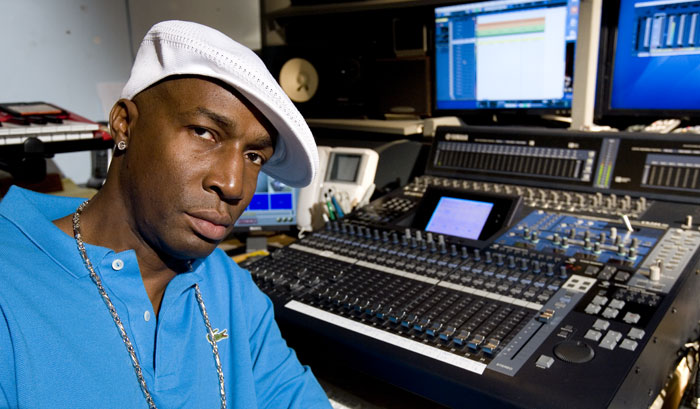


Grandmaster Flash may be the most important figure in hip-hop history. In the late '70s, his radical turntable techniques laid the style's sonic foundations. He was one of the first DJs to collaborate with rappers. His smash singles "The Message" and "White Lines" helped establish hip-hop as a vehicle for social commentary. The Rock and Roll Hall of Fame recently honored Flash's achievements, naming him one of five 2007 inductees.
If I save a project, I can always come back to it. I just press Recall, and the faders go zoooop. It's like Star Trek!
Flash, born Joseph Sadler, may be the Grand Old Man of hip-hop, but you wouldn't know it from talking to him. Funny and fast-talking, he bubbles over with a kid's enthusiasm for music and technology.
You've been busy. You were just inducted into the Rock and Roll Hall of Fame this year. You're working on your memoirs. What else are you up to?
Right now, I'm doing some stuff on my Yamaha board. [Laughs.] When I get started, I forget about everything else. I almost forgot about this interview. Sorry!
You've got a new album in the works.
Yeah. It's called The Bridge, and I'm doing it on the O2R96. I'm also using the Cubase sequencer program, which also happens to be owned by Yamaha. I'm using a lot of your stuff! I come from an analog-board world, so it took me a long time to find a digital board that would feel somewhat comfortable. The O2R96 sounds warm. The in-house reverbs, gates, and compressors are very good--they actually allowed me to drop a lot of my outboard effects. But what I like most is, if I save a project, I can always come back to it. I just press Recall, and the faders go zooooop. It's like Star Trek!
How have your composition and production techniques changed over the years?
I used to have racks and racks of keyboards. But now, with plug-ins, I can have tons of keyboards in my rig, and they don't take up any space! I like that, because certain keyboards have certain ambiences that I like to instill in the track. It's the teeny, tiny, weird sounds that sit in the back--the ear candy. When I enjoy a track, a lot of times it's the ear candy way in back, peeking out just over the sunset, that's sucked me in. It's what all these incredible producers do, like Timbaland, and Dr. Dre, and Swiss Beat.
When you write, do you start with a beat?
For the most part. But a lot of my ideas start with me just humming. I carry a recorder with me. I might be on a plane to Japan, and something will start tapping me on my shoulder, so I'll hum it into the recorder. Those are the things that inspire me, the things that hang around in the crevices of my mind.
Were you into technology as a kid?
Absolutely. When I was a kid I'd dismantle electronic items, just to see how they worked. The hair dryer. The stereo. I used to get my butt kicked. You know: "Never touch this dial. Never touch the stereo. And most important, do not go into Dad's record collection!" But when he'd go to work, I'd get a record--against the rules--go into the living room--against the rules--and touch the stereo--against the rules. I'd try to put the record back in the same place so Dad wouldn't know, but he always would, and I would get my butt kicked. Next day, he'd go to work, and I'd do the same thing.
Finally my mother said, "Since you're tearing up everything, I might as well send you to school." So I went to vocational/technical high school, where I learned that the colored things attached to a circuit board meant something. And that took me into DJing. My friends would say, "Yo, man, we met these hot girls," or "Let's go to the park and drink beer," but I'd be off somewhere dismantling an old car stereo. Or making speakers out of plastic tubs from the meat market. I won't say I threw away my teenage years, but that's where they went!
Meanwhile, I was trying out new ways of playing turntables, like repeating one part of a song using duplicate copies of the same record. The popular DJs would ridicule me. They'd say, "He ruins records--he puts his hands on them!" So I took it to the streets, and that eventually became the way to play because the audience enjoyed it so much. All those popular DJs had to go back and learn cutting and rubbing. And here we are.
So you didn't waste your teenage years--you invested them.
Actually, I had no idea that what I did would become the basis of hip-hop. I was just doing what I loved.
It sounds like you still love it.
I do. I'm sitting here in my studio. If I turn off the lights, the blinking gear makes it look like Christmas. I'm a kid all over again. I've got new toys. [Laughs.] I'm probably the biggest kid in hip-hop!
(Photography Credit: Jimmy Katz)
























